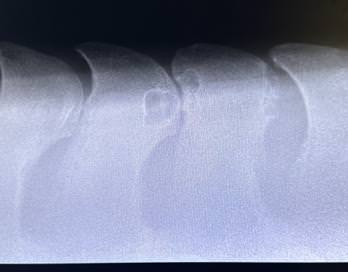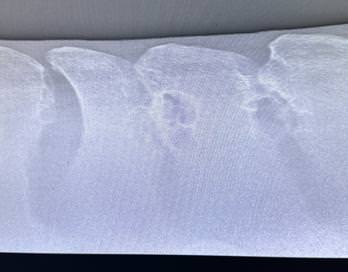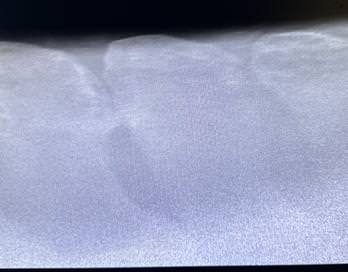I have found that to be very interesting as well. I am assuming it is because the seller is concerned about litigation and fears that admitting anything could be her fault to used against her. At the very least the seller should learn that ignoring a buyer isnt going to turn out well.
Nope, that’s exactly what she said happened. You’re remembering correctly.
Yes, he hurt Amos’ trainer.
Yes he hurt Amos’s trainer, however it was 7 months after the sale. We all know that a horse in somone else’s hands after 7 months is different to the horse that was sold.
I read the chronology as he hurt Amos’ trainer soon after arriving, before the surgery/rehab.
Now, post-surgery, entering rehab, nobody has been on him yet, including Amos.
No, it was ‘within weeks of arriving.’
But seemingly after the trainer had noted a tendency to buck on the right lead that she had felt was concerning for unsoundness. It seems that they were nonetheless trying to work through it, based on what the seller had said about thinking it was behavioral, and that’s the reason the seller is being blamed?

I think the horse owner here is less blaming and more informing the rest of the us to beware that this horse trader does not necessarily do all those things they boast about doing (wanting to do what is best for the horse, etc) and that their unwillingness to learn about Kissing Spine caused them to not realize this horse was in pain, so everyone else out there, be aware of this, so you too do not end up how they ended up.
Be aware that if you want X-rays, demand the X-rays no matter what the vet says.
Do not trust that the seller knows what they are talking about, or in some cases (not saying it is the case here) are willing to simply be dishonest.
Personally, I do not get why the seller did not respond when this buyer reached out. I bet things would have gone very differently if the seller responded and this buyer and the seller could have talked about the horse and everything to do with the surgery. Where the buyer felt like the seller was not hiding from something they did.
However, once a horse leaves the seller’s farm, a lot of variables change that may significantly aggravate pain…
This horse shipped from Delaware to, I think, Texas. This alone, even in a box stall, can cause a lot of body soreness, and we don’t know the length of time, route, or configuration for shipping.
Then there are the variables of stall and turnout at the new barn. Did stall size change? How about type and depth of bedding? What type of turnout and how much compared to previously?
Was the horse transitioned from his previous concentrate? Did he begin eating a different concentrate and how does it differ (eg, NSCs) compared to his previous feed? How much? What type of hay?
These are just a few examples of the many, many changes that may have affected how this horse felt mentally and physically after arrival at his new home and subsequently, his behavior under saddle. Without seeing him in person prior to purchase, neither Amos not her trainer can say whether or not his behavior at his new home was previously present to the same degree.
I’m not criticizing buying sight unseen, but it comes with a lot of risks that you have to be prepared for and accept (speaking from experience). I feel the buyer went into this without taking any of the risks into account and feels the seller is responsible for not producing the horse as imagined by the buyer.
We also don’t know the extent of communication or how it was actually handled. It’s easy to say the seller should have responded, but we don’t know the circumstances, what had been previously communicated, or any further details. At this point (when a buyer is blaming the seller for someone’s injuries), few, if any, sellers would want to further engage without having communication in writing.
Anyway, I feel the buyer has handled this purchase poorly in many ways, and I haven’t seen any actual evidence that this seller is unethical or lacks integrity, which is what the buyer said and keeps trying to prove here.
That just really rubs me the wrong way. The lessons learned here apply to any horse purchase with any seller.
If this was Reddit, this would get an “everyone sucks here” vote from me. Disappointing from the seller, the vet, and the buyer for the mistakes made in every angle for this horse.
Hope he is on the road to recovery and thank you for realizing this was a pain response!
Agree. But also what I wouldn’t give for a downvote button!
If I read right, the seller did respond - just via text rather than a phone call. Why is it okay for the buyer to require a specific mode of communication (phone) but not okay for the seller (text)?
These are the main conclusions I have from all of this, as well. I don’t have a bad view of the seller after all of this, I just would take into account that she might not pick up on certain things that are more likely pain-related, rather than just behavior.
What is generally included in the seller’s statement?
For point of education. This is why you always get back XRs regardless of what the broker claims or the vet recommends.
This is horrible, horrible pathology in a 6-yr-old horse (maybe just 7 at the time TB age).



This is what those radiographs translate to…
82F7F368-C0DC-417B-90A4-CCA8ED04AAC2
This is what pain looks like. Video taken w/in weeks of arrival. The level of pathology seen in these radiographs does not happen or become symptomatic in a matter of weeks. It is not brought on by travel, stall size, diet, etc.
I personally do not believe this pain went unnoted in the 2 years Ms. Redman’s friend rode this horse, nor do I believe he did not exhibit the same behavior at Ms. Redman’s barn. If Ms Redman truly believed this was a training issue, I hope she can place her rose-colored glasses next to mine instead of doubling down on her self proclaimed status of KS expert.
For reference, this video was taken after my trainer was injured and for the sole purpose of showing me how bad the pain display was, basically like, hey this is why I won’t get back on your horse and we are waiting on the vet. She really wanted me to SEE it. This was not an attempt at training it out of him or trying to work through it.
Why was he being double lunged in this setup? Did he buck like this when lunged normally? Or did he refuse to canter on the correct lead when lunged normally? And was he ever sore to palpation on his back during this time?
Those are definitely some nasty rads. I assume you went with the bone shave surgery?
I agree with this.
I am glad that the buyer was willing to do what they are doing for this horse. I am glad that the buyer admits mistakes but is putting the needs of the horse first.
That is not how I read it.
The horse’s first ride was filmed without edits and you can see this behavior. We don’t really know how much of this behavior was exhibited by the seller.
As far as the double lunging, I do not find it unusual that a horse being lunged in that manner for the first time would have a reaction, it’s a constrictive form of lunging where this horse is being asked for a lot more collection and a lot less forward than in the sales videos and a reaction is not a surprise especially if the horse had back issues.
Does the trainer lunge normally? Does he react the same way? Those are some gnarly back rads.
The horse trader seems to imply that all this horse’s training problems were from their friend (or someone on the friend’s behalf) not riding it correctly when they are explaining why the horse is so balled up, etc. The trader specifically mentions that is why it has so much trouble at the canter.
Jessica told me her friend (previous owner) rode him without issue. Had him for over 2 years OTT. Told me his bottled up behavior seen on video was minor, nothing more. Denied more explosive behavior. Told me her “friend has a tendency to back horses off. She’s a timid rider.” She told me these “training issues” were resolved with a new bit. Such nonsense. This horse almost killed my trainer within weeks of him arriving. To clarify, he is a LOVE of a horse with a huge fan club at my barn. He was in pain. Pain Redman passed as “behavioral.”
I found it. It’s possible, but who knows how much info was given that was accurate? I purchased a horse that the seller said had of trail riding experience. I took it somewhere and it acted like it had never seen uneven ground. Contacted the seller and they had taken it twice to a trail with flat groomed ground and ridden it at a walk.
I can absolutely see why Amo’s trainer’s style produced more extreme behavior especially if the double lunging is their riding style. I have seen horses with kissing spines be fine as say a hunter but not fine as a dressage horse. Different ask of the horse. It’s unfortunate.
